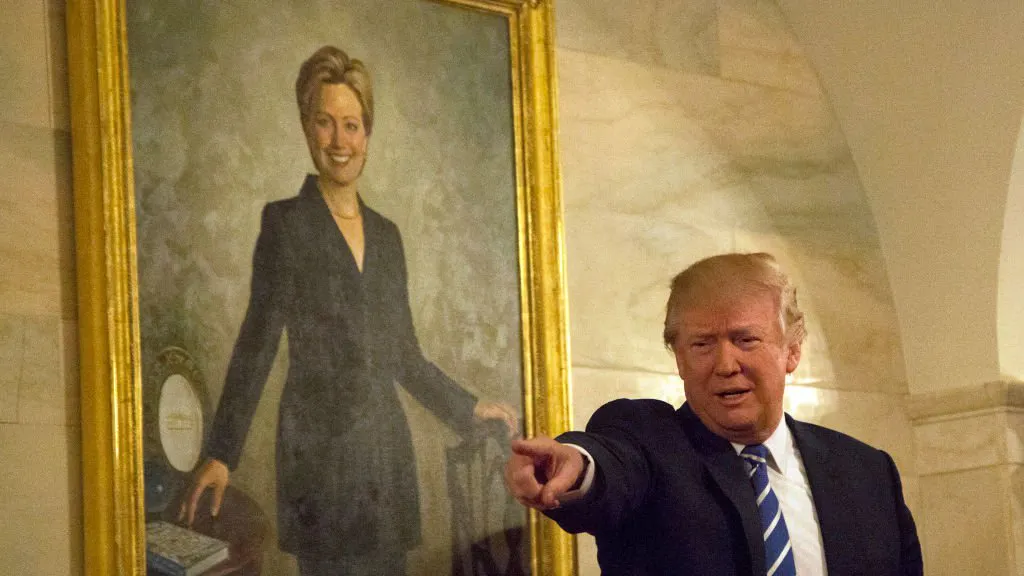President Trump turned the tables on Hillary Clinton’s “stole the election” routine on Monday in a post citing a report on how alleged bias in Google searches may have impacted the 2016 election. According to one expert’s findings, suggested Trump, his victory was “even bigger than thought!”
While Clinton has continued to blame a slew of factors on her stunning upset defeat at the hands of a former reality TV star and political outsider, she has been able to proudly tout one figure from 2016: Despite losing by a significant margin in electoral votes (304-227), she won the popular vote by about 2.9 million votes.
In a tweet Monday, Trump said that may not have been true without Google’s help.
“Wow, Report Just Out! Google manipulated from 2.6 million to 16 million votes for Hillary Clinton in 2016 Election!” Trump tweeted. “This was put out by a Clinton supporter, not a Trump Supporter! Google should be sued. My victory was even bigger than thought!”
Clinton quickly fired back by dismissing the study the claim is based on as “debunked” and claiming the study was based only on 21 undecided voters. “The debunked study you’re referring to was based on 21 undecided voters,” she wrote. “For context that’s about half the number of people associated with your campaign who have been indicted.”
As noted by Twitchy, the Clinton-supporting author of the study felt compelled to correct the former candidate he said he supported in 2016. “I’m a big #Hillary supporter, BUT … my 2016 monitoring findings were based on an analysis of 13,207 election-related searches, along with the 98,044 web pages to which the search results linked. The pro-Hillary bias was significant at the .001 level,” psychologist Robert Epstein tweeted.
While The Washington Post can be a little slow in fact-checking problematic claims by Democrats (see for example the paper’s recent belated fact-check on the claims about Michael Brown by Kamala Harris and Elizabeth Warren), the paper is quick to check Trump’s tweets. In this case, the Post‘s rather snarky response found that Trump flubbed his numbers a bit (2.6 million to 10.4 million) and, like Clinton, called into question the premises of Epstein’s study. But, in the process, they also showed that Clinton claiming the entire study was based on 21 undecided voters is misleading.
In July, Epstein told Congress that he estimated that Google had given “at least 2.6 million votes” to Clinton, at rock bottom, and as much as 10.4 million in the high end.
How exactly the search engine “gave” votes to Clinton, the Post notes, is rather dubious. “Getting millions of voters to vote a particular way is the sort of thing that political parties spend a lot of time trying to figure out. Epstein is claiming that more than 2 percent of all 2016 voters were influenced to vote for Clinton by Google. The scale is massive,” the Post’s Philip Bump writes. Bump then explains Epstein’s apparent methodology:
So why does he make this claim? He appears to have combined two bits of research he’s conducted: a 2015 look at how search engine results can influence political opinion and a collection of search results from users before the 2016 contest. Over the last 25 days of the campaign, a summary of the latter research suggests, “we found that search results were, on average, biased to favor Hillary Clinton on all of those days.” Given that his earlier research found results could influence views of candidates, we get the top-line assumption.
Bump also hits Epstein for failing to specify how the searches were conducted or who exactly participated in the study. Bump then discusses an aspect of the study that Clinton was referencing. While tens of thousands of web pages and over 13,000 searches were taken into account in the analysis, barely anyone personally responded to the study about how the search results impacted them:
This is more problematic because while the research points to thousands of search results that were analyzed, only 95 people actually provided responses to the study. Meaning if the results were driven by the identities of those individuals, the variation in the pool of results was actually 95. Oh, and of that group? Only 21 were undecided. If the 2.6 million figure derives from that group alone, the value of that figure is almost nil.
In summary, Trump is partly correct: A recent study, which was presented to Congress, did in fact find that at least 2.6 million votes were influenced in favor of Clinton by Google — though he flubbed the top-end number by about six million. According to the Post, however, Clinton is right to be highly skeptical of the study’s results.
Related: Trump: NYT Just Admitted What I’ve Been Saying All Along About Their Anti-Trump Agenda

.png)
.png)

